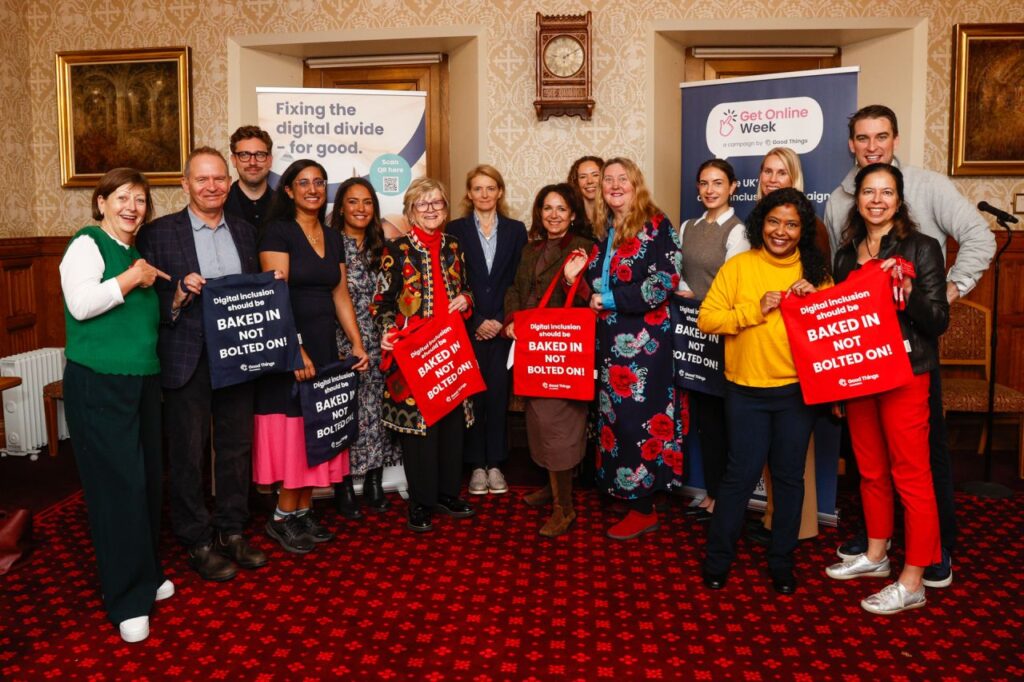
Image courtesy of Good Things Foundation
Attending the recent launch event for Get Online Week showed just how much is happening across the UK to help everyone get connected in our digital world.
Get Online Week, a national campaign by Good Things Foundation, sees hundreds of organisations across the UK holding events to help people build their confidence in using the internet and improve their digital skills.
The main speech at the event by Liz Lloyd CBE, Minister of State at the Department for Science, Innovation and Technology, gave a clear look about what’s being done – from collecting and donating old devices so they go to people who really need them, to working with local community groups and businesses to teach digital and AI skills.
What resonated most was the recognition that achieving digital inclusion is a complex, ongoing process that requires collaboration across various sectors. The Government’s commitment to integrating digital inclusion principles into broader departmental policies, guided by research, practical evidence and – most importantly – the voices of those most affected, came across loud and clear. The aim is simple: to help more people feel confident and ready for today’s tech-driven society. But there is still plenty of work to be done.
Brits lack confidence in online services
The latest data from Good Things Foundation shows that millions of Brits have intentionally avoided essential services.
In fact, 13% of Brits say that they feel fearful of going online. 45% are worried they could fall victim to an online scam or fraud. And because of a lack of confidence or trust, Brits have avoided: Banking and managing finances online (16%), Shopping (15%) and using NHS services or bookings (14%).
We can understand why Brits worry about staying safe online, and the reasons are something that we see daily in our role as guardians of .UK.
Phishing scams on the rise
Nominet has always taken seriously its responsibility to reduce abuse and harms originating from the .UK namespace. In fact – since the start of 2025, we’ve used third-party data to identify, verify, and suspend over 1,500 websites for phishing. It still goes to show the great work going on to identify potentially criminal activity in the online community and the volume of scams that we can prevent from reaching the consumer in the first place thanks to these reports. If you wish to help make .UK the safest place it can be online, then ensure to read our advice on watching out for scams and find about more about reporting abuse at the end of this blog.
We also work closely with law enforcement to help protect internet users from criminality online. When certified reports of unlawful online activity are reported to us by our partner agencies, we work quickly with our registrars to suspend domains in accordance with our Criminal Practices Policy – where you can also see the list of agencies we work with.
We’re proud that .UK remains one of the most trusted internet namespaces, and we’re equally proud of our social impact programmes – like with Good Things Foundation – that support and educate people to stay safe from online harm. Armed with this education and the work to keep .UK protected from criminal activity, we hope that consumers will feel increasingly equipped to navigate the online world with confidence and stay safe from threats.
Overall, the event highlighted how digital inclusion isn’t just a tech issue – it’s about making sure that no one gets left behind, and everyone has a fair chance. As well as that, consumers feeling safe online has to be just as much of a priority as having the means and literacy to get there. Whether that’s for learning, careers, or everyday life. Meeting all the people in the room showed how much effort is going into making this a reality – and it’s something that we’re proud to support.
How to recognise phishing scams and stay safe online
Here’s Nominet’s advice for consumers to recognise phishing and scam tactics and stay safe online:
- Remain vigilant. Most attacks prey on our busy lifestyles in the hope we won’t notice things are ‘a little off’. Be wary of any sense of urgency and pay attention if something doesn’t feel right.
- Be mindful of any contact that you have not initiated. If you receive an email, call, text or social media message that contains any of the above elements, you should exercise caution before responding.
- Always check the domain URL, the email address and the language used in any correspondence – especially if you are not the one who has initiated contact.
- Where possible, contact the company independently (use your search engine) to ask whether the communication was real. Check that the email address, content, and website domain are consistent and match and appear legitimate. Fake websites / spoofing websites may look identical to the legitimate website, but they will have a different URL (website address).
Reporting abuse
If you observe any malicious activity on a .UK, .CYMRU, or .WALES domain then we would please urge you to consider reporting this to Nominet through abuse@nominet.uk.
We would appreciate any additional evidence, context, and classification you can provide with your report so that we can ensure this is actioned proportionately to the threat presented.